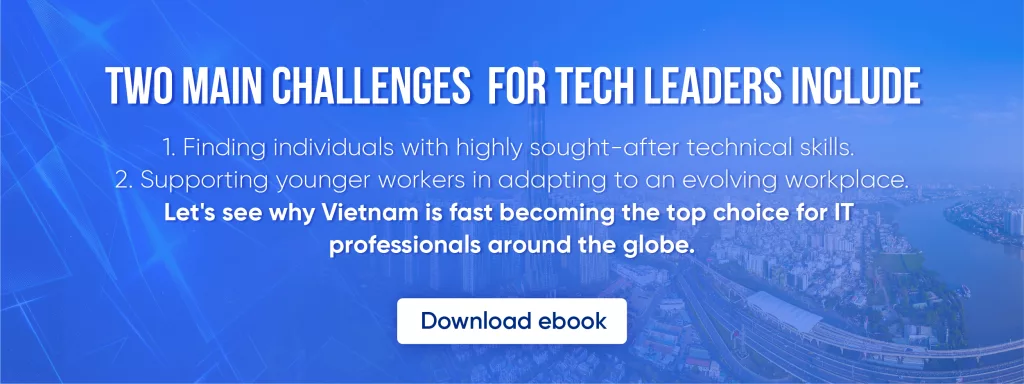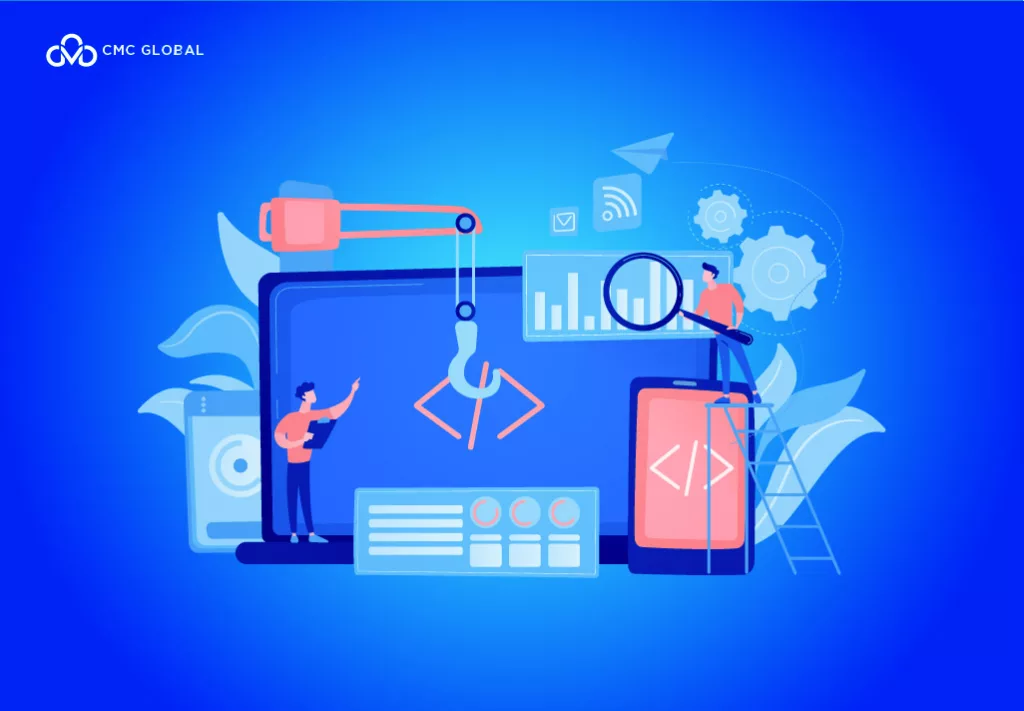In today’s digital age, software engineers are the unsung heroes behind the technology that powers our world. They are the architects, the problem solvers, and the creative minds who bring our wildest digital dreams to life. In this blog, we will introduce you to nine distinct types of software engineers, shedding light on their pivotal roles in shaping our technology-driven society.
What is software engineering
Software engineering is a discipline within the field of computer science that focuses on the systematic design, development, testing, and maintenance of software applications and systems. It involves applying engineering principles and best practices to software development to ensure that software is reliable, efficient, maintainable, and meets the requirements of its users.
Read more: Software Developer vs Software Engineering Comparison
9 different types of software engineers
Front-end Engineer
A Front-end Engineer, also known as a Front-end Developer, is a type of software engineer who specializes in building the user interface (UI) and user experience (UX) of a website or web application. They are responsible for creating the visual elements that users interact with directly when using a website or web application.

Front-end Engineers work on the client side of web development, which involves writing code that runs in a web browser.
Their main tasks and responsibilities include:
- HTML/CSS: Writing and structuring the HTML (Hypertext Markup Language) for web pages and using CSS (Cascading Style Sheets) to define these pages’ layout, design, and styling.
- JavaScript: Implementing interactive and dynamic features on web pages using JavaScript. This can include creating animations, handling user input, and making web pages responsive to different screen sizes and devices.
- User Interface (UI) Development: Designing and implementing the user interface elements such as buttons, forms, menus, and navigation bars to ensure they are visually appealing and user-friendly.
- Cross-Browser Compatibility: Ensuring that web applications and websites work consistently across various web browsers and platforms, addressing any compatibility issues that may arise
- Performance Optimization: Optimizing the front-end code and assets (such as images and scripts) to improve web pages’ loading speed and overall performance.
- Accessibility: Making web content accessible to individuals with disabilities by following web accessibility standards and guidelines (e.g., WCAG).
- Responsive Web Design: Creating responsive web layouts that adapt to different screen sizes and orientations, including mobile devices, tablets, and desktops.
- Version Control: Using version control systems like Git to track changes in the codebase and collaborate with other developers.
- Testing and Debugging: Thoroughly testing the front-end code for bugs and issues and using debugging tools to identify and fix problems.
Skills Required for a Front-End Developer
- Proficiency in HTML, CSS, and JavaScript
- Hands-on experience with front-end frameworks and libraries such as React, Angular, Vue.js, and jQuery.
- Comprehension of responsive design principles
- Understanding of challenges related to browser compatibility
- Familiarity with version control systems
- Proficiency in working with APIs
- Strong communication and collaboration abilities
Back-end Engineer
A Back-end Engineer, also known as a Back-end Developer, is a type of software engineer who specializes in building and maintaining the server side of web applications and software systems. While front-end developers focus on the user interface (UI) and user experience (UX), back-end developers work on the behind-the-scenes logic and functionality that power those front-end interfaces.

Here are the primary responsibilities and skills associated with a Back-end Engineer:
- Server-Side Development: Back-end developers are responsible for writing code and building the server-side components of a web application. This includes designing and implementing server infrastructure, handling data storage, managing user authentication, and processing requests from the front end.
- Databases: Proficiency in working with databases is crucial. Back-end developers often use relational databases (e.g., MySQL, PostgreSQL) or NoSQL databases (e.g., MongoDB) to store and manage data efficiently.
- Server-Side Programming Languages: Back-end developers typically work with server-side programming languages such as Python, Ruby, Java, Node.js, PHP, or C#. They use these languages to create the application’s business logic and handle server-side operations.
- API Development: Designing and implementing Application Programming Interfaces (APIs) to allow communication between the front end and back end of a web application. APIs are essential for data exchange and integration with external services.
- Security: Ensuring the security of the server-side code, including protecting against common web vulnerabilities like SQL injection, Cross-Site Scripting (XSS), and Cross-Site Request Forgery (CSRF).
- Scalability and Performance: Optimizing the back-end code and infrastructure to ensure the application can handle high traffic loads and perform efficiently.
- Version Control: Using version control systems like Git to manage and track code changes.
- Testing and Debugging: Thoroughly testing the back-end code, writing unit tests, and using debugging tools to identify and fix issues.
- Deployment and DevOps: Deploying applications to servers or cloud platforms and managing the deployment process. Familiarity with DevOps practices can be beneficial.
Skills Required for a Back-End Developer
- A high level of expertise in at least one programming language, such as Java, Python, PHP, Ruby, or Node.js.
- Comprehension of web development frameworks like Spring, Django, Laravel, or Ruby on Rails.
- Hands-on experience working with databases, including MySQL, PostgreSQL, MongoDB, or Cassandra.
- Understanding of server and network architecture.
- Familiarity with RESTful APIs.
- Strong capabilities in debugging and troubleshooting technical issues.
- Effective communication and collaboration abilities.
Full-stack Engineer
A full stack engineer, also known as a full stack developer, is a professional in the field of software development who possesses expertise in both front-end and back-end technologies, allowing them to work on all aspects of a web application or software project. The “stack” in full stack engineer refers to the combination of technologies and tools used in web development.

Full stack engineers are capable of working on the entire web development stack, from designing and building the user interface to developing the server-side logic and managing databases. They have a broad skill set and can bridge the gap between front-end and back-end development, making them valuable contributors to web and software development projects.
Skills required for a Full-Stack Engineer:
- Mastery of at least one programming language, such as Java, Python, PHP, Ruby, or Node.js.
- Proficiency in utilizing front-end frameworks and libraries like React, Angular, Vue.js, and jQuery.
- Comprehension of web development frameworks like Spring, Django, Laravel, or Ruby on Rails.
- Familiarity with various databases, including MySQL, PostgreSQL, MongoDB, or Cassandra.
- Understanding of server and network architecture.
- Competence in working with APIs.
- Strong capabilities in debugging and problem-solving.
- Effective communication and collaboration abilities.
DevOps Engineer
A DevOps engineer is a professional who works at the intersection of software development (Dev) and IT operations (Ops). The primary goal of a DevOps engineer is to streamline and automate the software development and deployment processes to enable faster, more reliable, and more efficient software delivery. DevOps is a cultural and technical movement that emphasizes collaboration, automation, and integration between development and operations teams to achieve these goals.

Key responsibilities and activities of a DevOps engineer include:
- Automation: DevOps engineers automate manual and repetitive tasks involved in software development and deployment, such as code builds, testing, and deployment processes. This automation helps reduce human error and speeds up the delivery pipeline.
- Continuous Integration (CI): Implementing CI practices, DevOps engineers integrate code changes from multiple developers into a shared repository frequently. They set up CI pipelines to build, test, and validate code changes automatically.
- Continuous Delivery/Continuous Deployment (CD): DevOps engineers enable continuous delivery (CD) or continuous deployment (CD) pipelines to automatically deploy code changes to production environments after passing automated tests. This accelerates the delivery of new features and bug fixes.
- Infrastructure as Code (IaC): DevOps engineers use IaC tools to define and manage infrastructure resources (servers, networks, databases) as code, making it easier to provision and configure resources consistently and reproducibly.
- Monitoring and Logging: They set up monitoring and logging solutions to gain insights into application and infrastructure performance. This helps identify and resolve issues proactively.
- Security: DevOps engineers integrate security practices into the development and deployment processes, ensuring that applications are built and deployed securely. This includes vulnerability scanning, access control, and compliance monitoring.
- Collaboration: DevOps promotes collaboration between development and operations teams. DevOps engineers facilitate communication, cooperation, and shared responsibility for the entire software lifecycle.
- Cloud Computing: Many DevOps practices are closely tied to cloud computing platforms like AWS, Azure, or Google Cloud. DevOps engineers often work with cloud services to build scalable and resilient applications.
Skills required for a DevOps Engineer
- Proficiency in scripting languages like Bash, Python, or Ruby.
- Hands-on experience with automation tools such as Chef, Puppet, Ansible, or Terraform.
- Knowledge of cloud platforms such as Amazon Web Services (AWS), Microsoft Azure, or Google Cloud Platform (GCP).
- Understanding of containerization technologies like Docker or Kubernetes.
- Familiarity with continuous integration and delivery (CI/CD) tools such as Jenkins, Bamboo, Travis CI, CircleCI, and similar platforms.
- Knowledge of monitoring and logging solutions such as Nagios, Prometheus, or the ELK stack.
- Strong problem-solving abilities.
- Effective communication and collaboration skills.
Data Engineer
A Data Engineer is a professional type of software engineer responsible for designing, developing, and managing the data infrastructure and systems within an organization. The primary focus of a Data Engineer is to ensure that data is collected, stored, processed, and made accessible in a form that can be used for various data analytics and business intelligence purposes. Data Engineers play a critical role in the data pipeline, enabling data scientists, analysts, and other stakeholders to work with clean, structured, and reliable data.

Key responsibilities and activities of a Data Engineer include:
- Data Ingestion: Data Engineers are responsible for collecting and importing data from various sources, which can include databases, logs, APIs, streaming data, and external data feeds.
- Data Storage: They design and manage data storage solutions, including databases (relational and NoSQL), data warehouses, data lakes, and distributed storage systems. They also define data schemas and data models.
- Data Transformation: Data Engineers transform and preprocess data to make it suitable for analysis. This may involve data cleansing, normalization, aggregation, and enrichment.
- ETL (Extract, Transform, Load): Implementing ETL processes is a common task for Data Engineers. They create and maintain workflows and pipelines that automate the extraction, transformation, and loading of data into storage and analytics platforms.
- Data Quality and Governance: Ensuring data quality and integrity is crucial. Data Engineers implement data quality checks, validation rules, and data governance practices to maintain data accuracy and consistency.
- Scalability and Performance: Data Engineers optimize data infrastructure for scalability and performance. This includes tuning databases, choosing appropriate storage solutions, and utilizing distributed computing frameworks.
- Data Security: They work on data security measures to protect sensitive data from unauthorized access and breaches, implementing encryption, access controls, and auditing.
- Streaming Data: In cases where real-time data is essential, Data Engineers may work with streaming data technologies like Apache Kafka or Apache Flink to process and analyze data as it arrives.
- Integration with Data Analytics Tools: Data Engineers collaborate with data scientists and analysts to ensure that data is available in formats compatible with analytics and visualization tools like Python, R, Tableau, or Power BI.
- Documentation and Collaboration: They document data pipelines, schemas, and processes for collaboration and knowledge sharing within the organization.
Skills required for a Data Engineer:
- Mastery of programming languages like Python, Java, or Scala for the creation and management of data pipelines, ETL procedures, and data models.
- Hands-on experience with big data tools and frameworks, including Hadoop, Spark, or Kafka.
- Knowledge of data warehousing technologies such as Snowflake, Redshift, or BigQuery.
- Proficiency in data modeling and the design of databases.
- Understanding of data governance and security practices.
- Adeptness in SQL for data querying and manipulation.
- Familiarity with cloud platforms like AWS, Azure, or Google Cloud Platform.
- Strong problem-solving capabilities.
Cloud Architect
A Cloud Architect is a specialized IT professional responsible for designing and overseeing the implementation of cloud computing solutions and strategies within an organization. Cloud Architects play a critical role in helping businesses leverage cloud technologies to achieve their goals, such as cost optimization, scalability, flexibility, and improved performance.

Key responsibilities and activities of a Cloud Architect include:
- Cloud Strategy Development: Cloud Architects work closely with senior management and stakeholders to define the organization’s cloud strategy. They assess business needs, objectives, and budget constraints to determine the best cloud approach, whether it’s public, private, hybrid, or multi-cloud.
- Cloud Infrastructure Design: They design the overall cloud infrastructure, including selecting the appropriate cloud service models (Infrastructure as a Service, Platform as a Service, Software as a Service) and cloud providers (e.g., AWS, Azure, Google Cloud). They also consider factors like data storage, networking, security, and compliance.
- Application Migration: Cloud Architects assist in the migration of on-premises applications and data to the cloud. They plan and execute migration strategies to ensure minimal disruption to operations.
- Cloud Security: Ensuring the security of cloud environments is a top priority. Cloud Architects design and implement robust security measures, including identity and access management (IAM), encryption, network security, and compliance with industry-specific regulations.
- Cost Optimization: They optimize cloud spending by selecting the right cloud services, monitoring resource usage, and implementing cost management strategies to control expenses.
- Scalability and Performance: Cloud Architects design systems that can scale up or down based on demand to ensure high performance and reliability. This includes leveraging auto-scaling and load balancing solutions.
- Disaster Recovery and Business Continuity: Planning for disaster recovery and business continuity is essential. Cloud Architects design backup and recovery solutions to ensure data integrity and minimal downtime in case of disruptions.
- Automation and Orchestration: They implement automation and orchestration tools and practices to streamline provisioning, deployment, and management of cloud resources.
- Documentation and Best Practices: Cloud Architects create documentation and best practices guides for cloud usage within the organization. They promote adherence to cloud governance policies.
Skills required for a Cloud Architect:
- Robust grasp of cloud computing principles.
- Competency in utilizing cloud platforms like AWS, Azure, or Google Cloud Platform.
- Expertise in cloud security practices.
- Acquaintance with cloud-native technologies, including containers, microservices, and serverless computing.
- Proficiency in crafting infrastructure and network designs.
- Comprehension of compliance and regulatory standards like HIPAA, GDPR, or PCI-DSS.
- Practical experience with cloud migration strategies and hybrid cloud configurations.
Security Engineer
A Security Engineer is a professional responsible for safeguarding an organization’s computer systems, networks, and data from cybersecurity threats and vulnerabilities. Their primary objective is to design, implement, and manage security measures and solutions to protect digital assets from unauthorized access, data breaches, malware, and other security risks.

Key responsibilities and activities of a Security Engineer include:
- Security Architecture and Design: Security Engineers design and develop security architectures and strategies tailored to the organization’s needs. This includes defining security policies, procedures, and best practices.
- Network Security: They implement and manage network security measures such as firewalls, intrusion detection and prevention systems (IDPS), virtual private networks (VPNs), and network segmentation to protect against unauthorized access and cyberattacks.
- Endpoint Security: Security Engineers secure individual devices (endpoints) such as computers, servers, and mobile devices. This includes deploying antivirus software, encryption, and access controls.
- Identity and Access Management (IAM): They manage user access to systems and data through IAM solutions, ensuring that only authorized individuals can access sensitive resources.
- Security Monitoring: Security Engineers set up monitoring systems to detect and respond to security incidents in real-time. This includes security information and event management (SIEM) solutions.
- Vulnerability Assessment and Penetration Testing: They conduct regular security assessments and penetration tests to identify vulnerabilities in systems and applications, then work to remediate those vulnerabilities.
- Incident Response: In the event of a security breach or incident, Security Engineers develop and execute incident response plans to mitigate the damage, investigate the incident, and implement corrective measures.
- Security Awareness and Training: They educate employees and users about security best practices and provide training to promote a security-conscious culture within the organization.
- Security Compliance: Security Engineers ensure compliance with relevant regulations and standards (e.g., GDPR, HIPAA, PCI-DSS) by implementing necessary security controls and conducting audits.
- Security Patch Management: They manage the process of applying security patches and updates to systems and software to address known vulnerabilities.
Skills required for a Security Engineer:
- Comprehensive knowledge of information security principles.
- Knowledge of security tools and technologies, including firewalls, intrusion detection and prevention systems (IDS/IPS), security information and event management (SIEM), and vulnerability scanning tools.
- Competence in scripting and programming languages like Python, Perl, or Ruby.
- Practical experience with security compliance frameworks such as PCI-DSS, HIPAA, or ISO 2700
- Familiarity with security services in cloud platforms such as AWS Security, Azure Security, or Google Cloud Security.
- Understanding of threat modeling and the assessment of risks.
- Strong analytical and problem-solving capabilities.
Software Engineer in Test (QA Engineer)
A Software Engineer in Test, often referred to as a QA Engineer (Quality Assurance Engineer), is a professional who specializes in both software development and software testing. This role combines elements of traditional software development with a focus on designing and implementing automated testing solutions to ensure the quality of software applications.

Key responsibilities and activities of a Software Engineer in Test (QA Engineer) include:
- Test Automation: QA Engineers develop and maintain automated test scripts and frameworks using programming languages (such as Python, Java, or JavaScript) and testing tools. These scripts are used to automate the execution of test cases, improving testing efficiency and repeatability.
- Test Planning and Design: They create test plans, design test cases, and determine the scope of testing based on software requirements and specifications.
- Test Execution: QA Engineers execute automated test scripts and analyze test results to identify defects, inconsistencies, or issues in the software. They may also perform manual testing when necessary.
- Regression Testing: Continuously running automated regression tests to ensure that code changes or feature additions do not introduce new defects while maintaining existing functionality.
- Integration Testing: Testing the interactions and interfaces between different software components to ensure they work together seamlessly.
- Performance Testing: Conducting load testing, stress testing, and other performance assessments to evaluate the software’s speed, scalability, and reliability under various conditions.
- Security Testing: Focusing on identifying security vulnerabilities and weaknesses in the software and recommending security improvements.
- Usability Testing: Assessing the software’s user-friendliness and user experience (UX) to ensure it meets usability standards and provides a positive interface for end-users.
- Continuous Integration/Continuous Deployment (CI/CD): Integrating automated tests into the CI/CD pipeline to ensure that every code change is automatically tested before deployment.
Skills required for a Software Engineer in Test (QA Engineer):
- Proficiency in one or more programming languages, such as Java, Python, PHP, Ruby, or Node.js, for the development of test automation scripts.
- Familiarity with various testing types, including Unit Testing, Functional Testing, Cross Browser Testing, UI Testing, and more.
- Understanding of testing frameworks like JUnit, TestNG, or PyTest for the creation and execution of test cases.
- Experience using automation testing tools and libraries like Selenium, Appium, Cypress, Playwright, Puppeteer, WebdriverIO, NightwatchJS, Espresso, XCUITest, Cucumber, and others.
- Knowledge of testing tools like BrowserStack Live, App Live, Automate, App Automate, Percy, App Percy, and similar solutions.
- Understanding of software development methodologies such as Agile and Scrum.
- Familiarity with databases to design Database Tests.
- Proficiency in continuous integration and delivery tools like Jenkins, Bamboo, Travis CI, CircleCI, and similar platforms.
- Strong analytical and problem-solving abilities.
- Effective documentation, communication, and collaboration skills.
Mobile Developer
A Mobile Developer is a software developer who specializes in creating applications (apps) for mobile devices, such as smartphones and tablets. Mobile developers design, develop, test, and maintain mobile apps to run on various mobile operating systems, including iOS (Apple), Android (Google), and sometimes others like Windows or cross-platform solutions.

Key responsibilities and activities of a Mobile Developer include:
- App Development: Mobile Developers write the code for mobile applications, implementing the functionality and features specified in the app’s design and requirements. They use programming languages like Swift or Objective-C for iOS development and Java or Kotlin for Android development.
- User Interface (UI) Design: They design the user interface (UI) elements and layouts of the app, ensuring it is visually appealing, user-friendly, and responsive on different screen sizes and orientations.
- Cross-Platform Development: Some Mobile Developers specialize in cross-platform development using frameworks like React Native, Flutter, or Xamarin. These frameworks allow developers to write code once and deploy it on multiple platforms, reducing development time and effort.
- Testing and Debugging: Mobile Developers conduct thorough testing of their apps to identify and fix bugs, issues, and performance bottlenecks. They also ensure compatibility with various devices and screen resolutions.
- Performance Optimization: Optimizing app performance is crucial. Mobile Developers work on minimizing app load times, improving responsiveness, and reducing memory and battery consumption.
- Integration of Features: They integrate various device-specific features like cameras, GPS, sensors, and push notifications into the app’s functionality.
- Security: Ensuring the security of user data and app interactions is a priority. Mobile Developers implement encryption, authentication, and authorization mechanisms to protect sensitive information.
- App Deployment: They prepare apps for deployment to app stores, following platform-specific guidelines and ensuring compliance with app store policies and requirements.
- Version Control: Using version control systems like Git, Mobile Developers manage and track changes to the app’s codebase, enabling collaboration and codebase management.
CMC Global – Your Trusted Partner for Software Engineers
At CMC Global, we offer top-tier software engineers to fulfill all your business requirements. Our comprehensive software development service includes Web Frontend Design, Backend Development, Custom Web Application, and SaaS Applications Development. We also deliver customized testing solutions for your company’s projects, guaranteeing optimized outcomes. Furthermore, we perform quality assurance assessments and provide you with a comprehensive report highlighting any detected issues and detailed instructions for their resolution.
Schedule a free consultation for further details!





